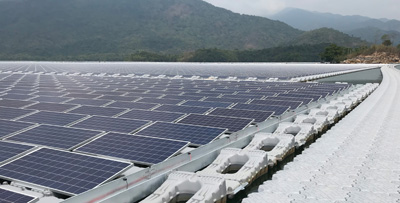| Plastics News |
Basf light stabilizers increase lifespan of floating solar panel systems
August 13, 2019 – Pontoons for floating solar panel systems can last longer under intense sunlight, thanks to light stabilizers from Basf, the manufacturer claims. Shanghai Qihua Water Photovoltaic Engineering Co., Ltd. in China is using Chimassorb and Tinuvin to make high density polyethylene (HDPE) mounting devices for floating solar panels. Floating solar panels are built on precision-engineered mounting devices, commonly called pontoons. HDPE is widely used to make pontoons which support the solar panels over the surface of water bodies, including lakes and reservoirs, as it has a lower density than water and is also recyclable. During the blow molding manufacturing process, an UV-absorber is added to prevent the degradation and discoloration of the polymer. In addition, blow molding grades should contain light stabilizers to make them ideal for outdoor applications. Basf’s range of light stabilizers include UV absorbers that act by shielding the polymer from UV light, and Hindered Amine Light Stabilizers (HALS) that act by scavenging radicals formed in the photo-oxidation process. In addition, Basf’s light stabilizers improve manufacturing productivity with more efficient continuous production, offering high chemical resistance and wide product stewardship compliance. “The combination of the Tinuvin UV absorber with Chimassorb HALS provides synergistic effects and can meet the design criteria for enhanced service life of pontoons,” said Hermann Althoff, Senior Vice President, Performance Chemicals Asia Pacific, Basf. “Through our collaboration with Shanghai Qihua on floating solar panel projects, we helped our customer to expand their business and contributed to increasing energy efficiency and conserving natural resources.” “Through the collaboration with Basf, we co-developed higher quality products,” said Kong Fei, Chairman of Shanghai Qihua. “With Basf’s plastic additives package, we now have the confidence to offer 25-year warranties. This helps us to expand our business to overseas markets.” Shanghai Qihua has already commenced several projects with the panels including a 55-megawatt (MW) project in a coal mining subsidence area of Huainan and Huaibei province in China, a 30MW project in Jiangsu Yancheng area, China, and a 200MW project in Vietnam. According to the World Bank, floating solar panel installations open up new opportunities for scaling up solar generating capacity, especially in countries with high population density and competing uses of land. Though floating systems are considered about 18% more expensive than land-based ones because of the need for floats, moorings, and more resilient electrical components, the projects bypass land use in forests and farmlands, and water can also help to cool the solar panels, increasing the efficiency by 10%. Other advantages include their comparative ease of installation and decommissioning, along with reducing evaporation because of partially covering the water surface, which preserves more water for energy and human use. China currently accounts for most of the more than 1.1 gigawatts of floating solar capacity now installed, based on the World Bank estimates. Basf Plastic Additives is part of Basf’s Performance Chemicals division. The division’s portfolio also includes Fuel and Lubricant Solutions, Kaolin Minerals, as well as Oilfield and Mining Solutions. Customers from a variety of industries including Chemical, Plastic, Consumer Goods, Energy & Resources and Automotive & Transportation use BASF products and solutions. Source: BASF
.
|


